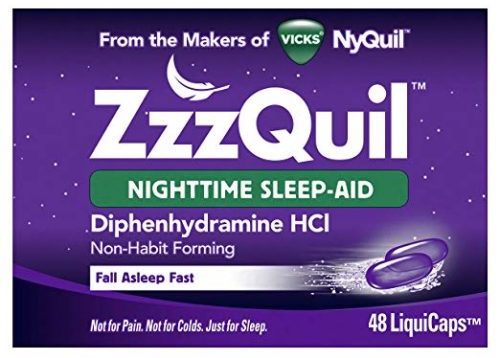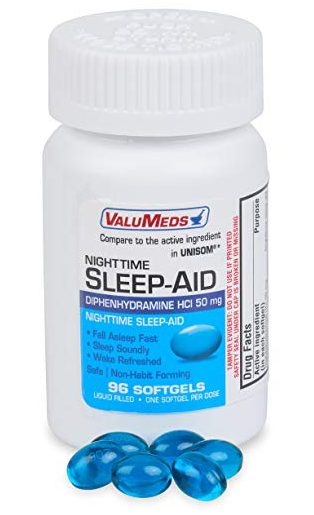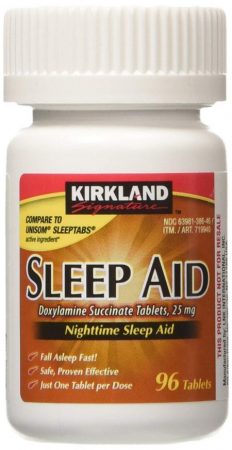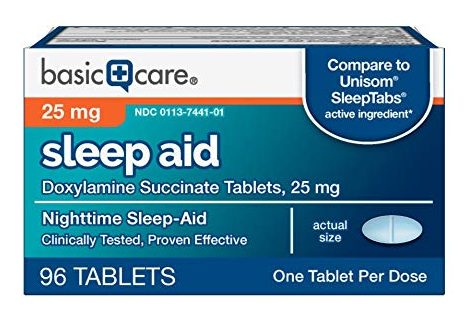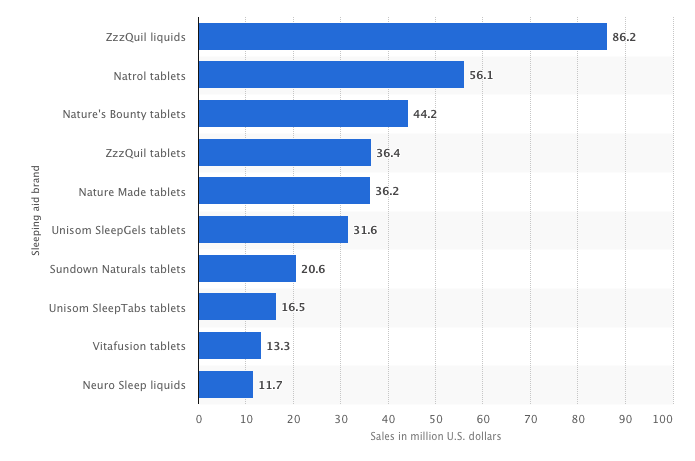Buying Guide – How to Shop for Over-the-Counter Sleep Aids
There’s a lot to understand when it comes to OTC sleep aids. And like any product you put into your body, you want to know how to safely use them. In our buying guide, we’ll outline everything you need to know about OTC sleep aids, including how they work, different types, safety information and other techniques for improving sleep.
How Sleep Aids Work: Diphenhydramine HCl vs. Doxylamine Succinate
The main way to distinguish between different OTC sleep aids is by looking at their active ingredients. Most products on the market contain either Diphenhydramine HCl or Doxylamine Succinate. Both are antihistamines, which are typically used to treat allergy symptoms, like a runny nose or itchy eyes. When you have an allergic reaction or a cold, histamines are released in your body to increase blood flow to the site of invasion. Antihistamines work by blocking histamine receptors in cells to reduce the allergy symptoms related to the histamine response.
Many first-generation antihistamines, like Diphenhydramine HCl and Doxylamine Succinate, also make you drowsy. That’s because they don’t differentiate among various histamine receptors and inhibit histamines that regulate sleep. That might not be desirable if you’re taking an antihistamine for allergy relief, but it makes both compounds ideal for use in sleep aids.
Diphenhydramine HCl and Doxylamine Succinate function fairly similarly, but there are some marked differences:
Diphenhydramine HCl
Diphenhydramine HCl is used in sleep aids more often than Doxylamine Succinate. That might be because it’s often less expensive than its counterpart. It also leaves the body fairly quickly, making it milder than Doxylamine Succinate. It’s a great choice for those who have never used a sleep aid before because it’s less likely to cause drowsiness, or the hangover effect, the next morning. The downside is that users can build up a tolerance fairly quickly, so it loses its effectiveness relatively fast. That makes it a better fit for someone who only plans to take it for a couple of nights at a time.
Doxylamine Succinate
Doxylamine Succinate is the stronger of the two sedating antihistamines. It can be a bit more expensive than Diphenhydramine HCl, but some users find it more effective. That’s because it tends to leave the body more slowly, helping users stay asleep longer. Most people who use sleep aids with Doxylamine Succinate remark that they feel the effects fairly quickly after taking a dosage. Users tend not to develop a tolerance very quickly, too, so it’s a good fit for those who need to take it over a longer period of time. The drawback is that Doxylamine Succinate is more likely to cause the hangover effect the next morning.
Types of Sleep Aids: OTC vs. Natural vs. Prescription Drugs
Sleep aids fall into three main categories: over-the-counter, natural or herbal supplements, and prescription drugs.
- Over-the-counter sleep aids are typically antihistamines. They’re designed to address short-term sleeplessness, not insomnia. Their side effects are typically mild, such as drowsiness the next day, which is why they can be sold over the counter. However, there are instances where these can be unsafe for people.
- Natural sleep aids include dietary and herbal supplements containing ingredients like melatonin, valerian, or chamomile. Like over-the-counter sleep aids, these have not proven effective as a treatment for long-term insomnia. Natural sleep aids may come in the form of herbal teas, pills, or ointments.
- Prescription drugs target different parts of the brain to induce sleep. Doxepin (Silenor) blocks histamine receptors, enabling the person to stay asleep throughout the night, while zolpidem (Ambien and others) help induce sleep by activating the neurotransmitter GABA and binding it to GABA receptors. Prescription drugs require a prescription because these are designed to help treat chronic insomnia and other sleep disorders like sleepwalking. These drugs are stronger and have stronger side effects which can cause extreme drowsiness, sleep-driving, or more if not taken as prescribed.
In this article, we are focusing on over-the-counter sleep aids. For information on other types of sleep aids, refer to our resource pages for Natural Sleep Aids, and Melatonin.
Are over-the-counter sleep aids safe?
Generally, sleep aids are considered safe for short-term use. It is when people misuse sleep aids, particularly by using them on a long-term basis, that they become dangerous.
Unfortunately, this describes a significant number of the people who use sleep aids. Just under 20% of people take sleep aids to help them fall asleep every night. Among older adults, that number is even higher: over a third of adults age 65-80 regularly rely on some form of OTC, prescription, or natural sleep aid on a daily basis.
Because they are not addictive the same way other drugs are, the FDA allows the “non-habit forming” label to be used for OTC sleep aids – but that’s assuming safe use. Given the frequency with which people don’t use sleep aids safely, and the billion-dollar industry they’ve become, researchers are concerned about the risk for dependence.

For example, one 2008 study of rats found that diphenhydramine and cocaine – a highly addictive substance – had a similar effect on dopamine release in the brain.
OTC sleep aids are simply not designed to be a long-term solution for insomnia. Insomnia requires treatment that can address underlying conditions. When people take higher than the recommended dose of an OTC sleep aid, use them on a long-term basis, or otherwise don’t follow safe use guidelines, their risk of dependence and other adverse outcomes may increase.
When should you use sleep aids?
Sleep aids should be used on a short-term basis to relieve difficulty falling asleep during a period of two weeks or fewer. Good examples of this may include:
- Using sleep aids to manage jet lag after traveling across time zones.
- Using sleep aids as advised by a doctor to facilitate sleep while recovering from a medical procedure.
- Using sleep aids on another, as-needed, short-term basis to help a person fall asleep.
Sleep aids are designed to help you fall asleep when there is a temporary situation causing difficulty sleeping. They are not designed to cure chronic insomnia. It’s important to use sleep aids sparingly and on a temporary basis, for both your immediate sleep needs and your long-term help.
Sleep aids work because they are highly effective, but that’s also what can make them potentially addictive. If a person comes to rely on the sleep aid to help them fall asleep, instead of adjusting their lifestyle or behavior, or addressing the underlying health conditions that contribute to their insomnia, they’ll always have trouble sleeping without the sleep aid. If sleep aids are used as a long-term solution, the underlying issue is never resolved. Not only will their insomnia persist, but the person may begin to experience other unfortunate side effects as well.
Instead of applying a short-term fix to a long-term problem, the healthier, more sustainable approach is to implement lifestyle and behavioral changes for better sleep. Just a few lifestyle changes can relieve insomnia for a majority of people. We’ll review these in a later section of the article.
Side effects of over-the-counter sleep aids
Even when used on a short-term basis, sleep aids, like most drugs, may cause side effects that make them unsafe for some people. Over-the-counter sleep aids do have fewer side effects than prescription sleep aids, but they are still important to be aware of. They include:
- Moderate or severe daytime drowsiness (this “hangover effect” is the most common side effect)
- Feelings of dizziness or being off-balanced
- Forgetfulness
- Headaches
- Blurred vision or dry eyes
- Constipation or urinary retention
- Dry mouth, nose or throat
- Nausea
When You Should Avoid OTC Sleep Aids
There are instances where over-the-counter sleep aids pose a stronger risk for certain groups of people. If you fall into one of the following categories, you should probably avoid sleep aids altogether or at the very least consult your doctor first before using them.
Children
Generally, most OTC sleep aids should be avoided by children younger than 12 years old. Depending on their age, children have different physiologies than we do as adults. Taking the same dosage or medication as recommended for adults can be very unsafe for children. Doctors even recommend that the pediatric dosage be adjusted for natural sleep aids like melatonin.
Also, there are a variety of insomnia triggers that may be unique to a child’s experience, such as a fear of the dark, nightmares, sleepwalking, or trouble at school.
Pregnant or breastfeeding
During pregnancy, a woman’s body goes through extreme changes that can make restful sleep difficult to achieve. Unfortunately, sleeping well is important to a healthy pregnancy. But the hormonal and physical changes associated with pregnancy can increase the mother’s risk of suffering adverse side effects from taking over-the-counter sleep medication.
Consult with your doctor before using natural sleep aids, too. The body’s production of melatonin naturally increases at 24 and 32 weeks of pregnancy, and scientists have not yet determined whether melatonin is safe for pregnant mothers. One study of rats found that melatonin negatively impacted the size, health, and mortality rate of their pups.
Sick with an illness
If you are temporarily sick and are taking other over-the-counter medications to relieve your symptoms, they may negatively interact with a sleep aid. Since most over-the-counter sleep aids are antihistamines, and you are also taking antihistamines for a cold or allergy, you may inadvertently overdose and cause adverse side effects.
It is best to avoid taking sleep aids in addition to other medication when you’re sick, unless your doctor has given you the go-ahead. Instead, try switching to “nighttime” versions of your medication at night to help you fall asleep.
Taking other medications
If you have a chronic condition and regularly take other medications to manage your system, you’ll want to consult with your doctor before introducing an over-the-counter sleep aid into the mix. You just want to be sure that the ingredients don’t interact negatively with each other.
Chronic conditions that pose a particular risk include sleep apnea, asthma or another chronic lung disease, glaucoma, severe liver disease, Alzheimer’s, or urinary retention or problems due to an enlarged prostate.
Your doctor may be able to suggest a healthy sleep aid option for you that won’t affect your medication, or you may rely on the behavioral methods below to help you fall asleep better.
Behavioral Techniques to Improve Sleep
For a long-term fix to your insomnia, healthcare professionals, sleep experts, and researchers alike recommend employing behavioral techniques. Studies consistently show that lifestyle modifications and behavior changes can solve a multitude of sleep problems for most people.
Review the following list of research-backed sleep tips. Consider how you can incorporate more of these into your life so you don’t need to rely on over-the-counter sleep aids.
- Keep your bedroom cool, dark, and quiet. The optimal temperature for sleep is in the low to mid-60 degrees Fahrenheit. To facilitate deep, restful sleep, set your bedroom thermostat to a cool temperature, and make your bedroom as dark and as quiet as possible.
- Follow a consistent sleep schedule. Go to bed and wake up at the same time everyday. Ensure there’s room for you to get at least 7 hours of sleep between those times.
- Reserve your bedroom for sleep and sex only. The goal is to train your mind to view your bedroom as a location for sleep and restfulness, not work or leisure.
- Practice relaxation techniques before bed. Deep breathing exercises, progressive muscle relaxation, meditation and visualization can all physically relax your body and induce sleep.
- Develop and follow a calming bedtime routine. Each night, complete the same set of activities in the 30 to 60 minutes before you go to bed. These may include your relaxation techniques, along with activities like brushing your teeth or taking a warm bath. Whatever activities you choose, they should be relaxing and help prepare you for sleep.
- Avoid using electronics at least 1 hour before bed. One thing your bedtime routine should not include is watching TV or checking email. The blue light in electronic devices is perceived especially strongly by the receptors in your brain, and interpreted as sunlight. Your brain responds by keeping you awake, instead of allowing you to relax and fall asleep.
- Don’t eat or drink heavily at night. Heavy meals and alcohol consumption can cause indigestion and disrupt the quality of your sleep. Instead, hydrate with water and snack on light, sleep-promoting foods.
- Exercise during the day. Exercise physically tires your body out, and it also helps reinforce your natural circadian rhythms. By exercising during the day, you raise your body temperature. As your temperature goes down, your brain begins its natural melatonin production later in the evening, enabling you to fall asleep by bedtime.
- Get natural light during the day. Speaking of your circadian rhythms, natural sunlight gives you an energy boost during the day. When the sun lowers in the afternoon, your brain recognizes the change and begins to prepare you for sleep.
- Try cognitive-behavioral therapy for insomnia (CBT-I). If you are still having trouble sleeping, CBT-I is the most effective treatment for insomnia. Over a period of weeks to months, a specially trained therapist works with you to help you understand the thoughts and behaviors you engage in that inhibit healthy sleep, and then provides you with exercises to change them.
